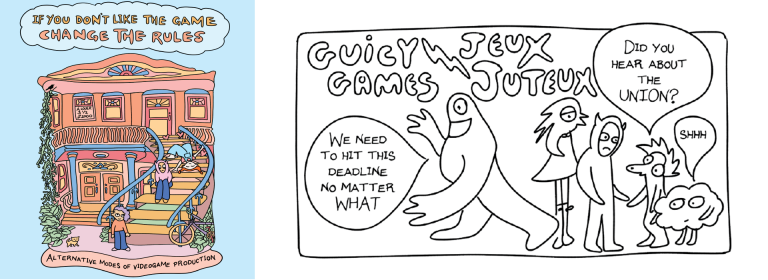A comic and new Concordia-authored white paper highlight labour struggles in Canadian video-game industry

In the fast-paced world of video-game development, tales of gruelling crunch periods and toxic work environments have long plagued the industry.
Concordia communications PhD student Michael Iantorno and Marie LeBlanc Flanagan of the Game Arts International Network have released a white paper highlighting how worker co-ops, unions and other alternative working arrangements have emerged in response to these labour issues. A white paper is an in-depth report that informs readers concisely about a specific issue and presents a solution, usually backed by persuasive research findings.
The 60-page white paper, If You Don’t Like the Game, Change the Rules: Alternative Modes of Videogame Production, joins a previously released comic based on the same research.
The two documents are designed to complement one another: the white paper synthesizes research findings for a more industry-focused audience, while the comic provides an approachable narrative for those interested in alternative labour structures in the game industry.
For the project, Iantorno and Flanagan surveyed 52 game developers from across Canada and conducted in-depth interviews with 36 co-op worker owners, union organizers and labour experts.
The results revealed many of the labour challenges endemic to the video-game industry. But it also showcased some of innovative solutions game developers are already experimenting with to build better futures for themselves and their studios.
Iantorno and Flanagan found that 60 per cent of respondents experienced unsustainably long hours — a crunch — 46 per cent suffered from a lack of creative freedom, 44 per cent earned salaries below a living wage, 35 per cent dealt with employment loss and precarity and 27 per cent experienced harassment based on identity.
‘Curiosity is growing toward different employment futures’
Many respondents conveyed excitement about the possibility of new labour initiatives — for example, 50 per cent looked approved of four-day work weeks and 21 per cent of remote or hybrid working arrangements. They also expressed a growing desire to shed traditional studio structures.
Worker co-operatives and unions were seen as a way to transform harmful management structures, gain greater creative freedom and improve working conditions.
“This project has allowed us to speak with folks from co-ops and unions to learn about how paradigms are starting to shift and how curiosity is growing toward different employment futures,” Iantorno says.
“We’re at a very exciting moment in the game industry as unions are beginning to form all across North America and worker co-ops are gaining a foothold in the indie scene.”
Despite this optimism, many game developers remain reluctant to support union efforts in their current workplace or start up a new game studio as a worker co-op.
Almost 90 per cent of survey participants believed that unions could improve the game industry, but under 60 per cent would support a union effort at their own company and less than 20 per cent were interested in starting a union campaign themselves.
“There is definitely a disconnect between liking the idea of a union and a desire to tangibly support labour organization efforts, which I believe is tied to the type of studio and the ability for folks to take on personal risk,” Iantorno notes.
There are challenges inherent to the worker co-op model as well. Many seasoned co-op worker owners mentioned that their business model was not well understood or embraced, making it difficult for them to find reliable funding and industry professionals, such as lawyers, who fully understood their needs.
Iantorno hopes the white paper and comic can provide foundational information on worker co-ops and unions in the Canadian video-game industry and what it is like to operate them.
The documents provide important information for those who are interested in starting a worker co-op or union, including the challenges and benefits of each labour model. The paper also includes sections where co-op members and union organisers provide advice based on their experiences.
Read the cited white paper: If You Don’t Like the Game, Change the Rules: Alternative Modes of Videogame Production.
Michael Iantorno is a member of Concordia's Milieux Institute. Find out more about the graduate research institute for new media arts, digital culture and information technology.


